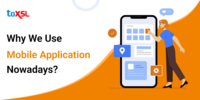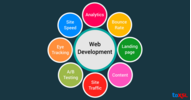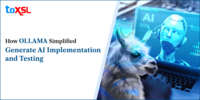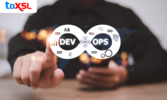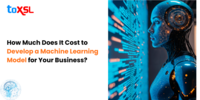- Dec 04, 2025
Share this post on:
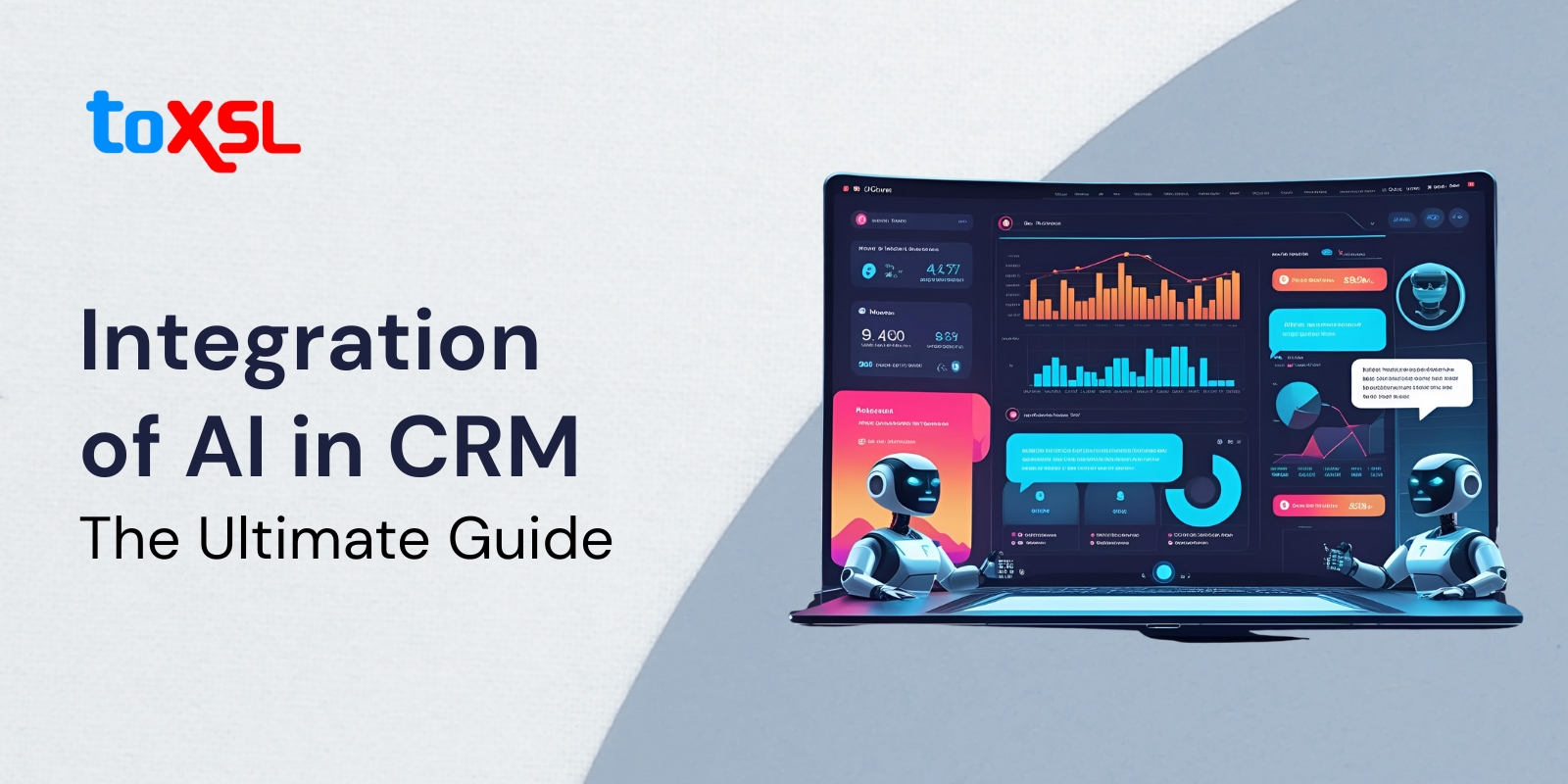
The global customer relationship management (CRM) software development market is estimated to reach $98.84 billion in 2025. Furthermore, the average spent per employee in the CRM software market is estimated to be $26.36 in 2025.
Customer Relationship Management solutions are crucial in maintaining customer connections, allowing businesses to improve service quality. However, with the advent of Artificial Intelligence, CRM has entered a new era where data-driven insights, automation, and customization are at the center of customer interaction. AI has revolutionized how businesses understand, engage with, and serve consumers.
Key Takeaways
- AI transforms CRM with predictive analytics and automation
- Enhances customer engagement via hyper-personalized experiences
- Boosts sales efficiency with lead scoring and intelligent follow-ups
- Improves decision-making with real-time business insights
- Future-ready CRM includes voice, sentiment, and emotion detection
The Rise of AI in CRM
AI is changing businesses in numerous ways. A large part of the business that AI has transformed is the sales department, in its extension, CRM. The integration of AI in CRM is used to achieve business growth by supporting business operations in numerous ways.
In general, the significant part of using AI in business operations is the ability of AI to handle and analyze large amounts of data using data analysis. Integrating AI in CRM software allows businesses to take customer data, analyze it, and understand customers’ behavior and needs. Further, companies can easily predict customer needs, customize marketing efforts, and offer support that is not only fast but also effective.
For example, AI can help sales teams figure out which customers are most likely to buy and recommend the best times to get in touch. AI also helps businesses suggest products a customer might like based on what they’ve bought before. This saves the time of salespeople and allows them to spend more time having real conversations that lead to sales and loyal customers. As AI continues to learn and improve over time, its responses become more helpful and more human-like, showing understanding and empathy.
However, AI in CRM can improve every step of the customer’s experience. Whether it is product recommendation, sharing customized content, or offering help before you even ask, integrating AI in CRM systems changes the entire game for businesses and their customers.
Steps to Integrate AI in CRM
Here are a few essential steps that will help you integrate AI into your CRM system properly.
Define Clear Business Goals: Is your business goal clear to you? Why do you want to incorporate AI into your existing CRM software? A few things to consider include lead scoring and qualification, automated follow-up and outreach, customer support ticket routing and prioritization, data enrichment, validation, and cleanup. Also, be sure to define measurable Key Performance Indicators (KPIs), including conversion rate improvements, reduced response times, or increased data accuracy. Setting clear objectives ensures your AI integration efforts are focused and results can be evaluated properly.
Assess Your Existing CRM: Evaluate your current CRM system’s capability and compatibility with AI tools. Not all CRMs need to support seamless AI integration or have a built-in AI feature. Further, before integrating AI in CRM, it is crucial for businesses to clean CRM data beforehand, remove duplicates, fill missing fields, and categorise customer data consistently, as AI systems consume data for learning and decision-making. Using wrong or duplicate data can reduce effectiveness.
Select the Right AI Tools: Choose AI platforms, frameworks, or CRM extensions that are in alignment with your business demands and technical environment. Ensure to consider deployment options, cost, and scaling potential, and the CRM developer must know programming languages such as Python and JavaScript.
Plan the Integration: Create a detailed implementation roadmap, such as timelines, resource allocations, and responsibilities. Also, map out how AI tools will interact with your CRM systems, for example, a decision tree for lead scoring and automated workflows for data enrichment.
API Integration: While doing API integration, ensure secure connections by implementing protocols such as OAuth 2.0. Test API connections properly via data flow integrity and error handling to avoid disruptions.
Pilot Testing: Pilot testing involves monitoring AI performance against your KPIs and gathering user feedback from sales, marketing, and support teams. Ensure to maintain human-in-the-loop supervision to ensure AI suggestions remain aligned with business goals and customer expectations.
Team Training: Do you want AI adoption to succeed? AI adoption succeeds only if your teams understand and trust the technology. So, it becomes important for businesses to conduct proper training sessions on how AI features work, how to interpret AI insights or alerts, and best practices for collaborating with AI agents.
Deployment and Optimization: Once the CRM developer is confident in performance and user adoption, the business can use an AI-integrated CRM system throughout the company. Hence, establish continuous monitoring to track system performance and uptime, measure effectiveness against KPIs, and gather user and customer feedback.
Benefits of AI in CRM
There are several benefits to AI-integrated custom CRM development systems.
Enhanced Efficiency and Productivity: AI in CRM systems automates time-consuming and repetitive tasks, including data entry, scheduling follow-ups, and updating customer records. AI-powered automation reduces human error and allows you to focus on meaningful work.
Customized Customer Engagement: Modern customers expect brands to understand their needs, and AI is helping businesses understand their preferences and behavior immediately. This helps businesses create customized user experiences.
Optimized Lead Management: AI increases lead management by scoring leads based on their likelihood to convert, taking into account various variables that humans might ignore. This customization helps sales teams keep their focus on high-potential leads. With automated lead routing, incoming leads are instantly assigned to the right sales representatives, ensuring faster response times and higher conversion rates.
Smarter Marketing Campaigns: AI helps businesses customize their marketing campaigns. It can customize content, offers, and even pricing for individual customers. Automated AI systems develop customized email sequences and social media advertising, improving campaign effectiveness through ongoing data analysis.
Use Cases
Let us discover the various use cases for AI in CRM. However, they can change depending on the business.
Data Management: Integration of AI in CRM helps businesses keep customer data clean and accurate. It allows businesses to automate their processes, including data entry, cleaning, and enrichment.
IT Efficiency: Want to simplify and automate routine tasks? Integrating AI in CRM can help you achieve your goal. AI is helping IT departments to automate their tasks, including ticket routing and diagnostics.
Marketing Personalization: AI-powered CRM systems help organizations customize marketing material as per customer requirements and their behavior, including purchase history and engagement.
Lead Management: AI’s predictive lead scoring benefits sales businesses. An AI model analyzes numerous signals such as engagement history, buying signals, online behavior, and social behavior to assign conversion scores to leads. Automated lead engagement prospects with customized content until they are sales-ready. This approach improves conversion rates, reduces wasted effort on poor-quality leads, and shortens the sales cycle.
Sales Optimization: AI helps the sales team get deal insights powered by AI, including next-best action recommendations, competitive intelligence, and pricing optimization suggestions. AI models monitor pipeline activity and alert teams about potential risks or opportunities. Some AI-driven CRMs can generate predictive sales forecasts by evaluating historical data alongside external market indicators, helping businesses set realistic targets and allocate responses effectively.
Business Intelligence: AI in CRM transforms data into actionable business intelligence by extracting trends, sentiments, and customer insights automatically. For instance, AI-powered analytics tools develop real-time dashboards that show customer needs and sales performance. These insights help businesses make informed decisions about market strategy.
Customer Service: AI-powered chatbots are helping businesses handle conversations. They offer answers to FAQs, troubleshoot simple issues, and route complex problems.
The Future of AI in CRM
Artificial Intelligence (AI) is revolutionizing the way businesses manage customer relationships. The future of AI in CRM (Customer Relationship Management) lies in hyper-personalization, automation, and predictive analytics. AI enables CRM systems to analyze vast amounts of customer data, predict buying behavior, and deliver personalized experiences across all touchpoints.
With AI, businesses can automate routine tasks such as lead scoring, automated follow-up, and email responses, allowing sales teams to focus on building genuine relationships. Intelligent chatbots powered by AI enhance customer service by offering instant, 24/7 support and resolving queries in real-time.
Moreover, AI-driven CRM systems can anticipate customer needs by analyzing historical data and engagement patterns. This results in more targeted marketing campaigns, higher conversion rates, and improved customer satisfaction.
As technology evolves, integration of AI in CRM will become more advanced with features like emotion detection, voice recognition, and real-time sentiment analysis. This will empower businesses to connect with customers on a deeper, more human level.he future of AI in CRM is bright as new AI tools are developing, including voice recognition and augmented reality. Artificial Intelligence is transforming the way the world looks at the customer experience. Further, businesses integrating AI in CRM are staying ahead of the curve and thriving in customer relationship management.
Conclusion:
The integration of AI in CRM systems is changing how businesses approach sales, marketing, customer service, and business strategy. AI-powered CRM offered a competitive edge in today’s customer-centric marketplace. AI-powered CRM offers a competitive edge in a customer-centric marketplace. It automates mundane tasks and delivers highly customized customer interactions.
If you’re ready to integrate AI in your CRM or want to learn how to start? Are you looking for the leading custom CRM software development company for your business? ToXSL Technologies is here to help! We specialize in AI-enabled CRM platforms and help businesses to maximize their potential. Want to learn more? Contact us today.
FAQs
How are Salesforce and AI connected?
Salesforce and AI are seamlessly connected through Salesforce Einstein, the company’s integrated artificial intelligence layer. Einstein brings predictive insights, smart automation, and intelligent recommendations into the CRM platform. It helps users prioritize leads, optimize workflows, and automate follow-ups based on data patterns. This AI-driven functionality empowers sales, marketing, and service teams to make informed decisions and build stronger relationships with customers in real-time.
What’s the benefit of combining CRM and AI?
The combination of CRM and AI delivers a powerful synergy for businesses. AI enhances CRM systems by providing real-time customer insights, automating repetitive tasks, and offering predictive behavior analysis. This integration helps businesses engage customers more effectively, personalize their experience, and improve sales outcomes. The result is faster decision-making, reduced manual effort, and increased customer loyalty—making CRM systems significantly smarter and more strategic.
What is an artificial intelligence CRM system?
An Artificial Intelligence CRM system integrates AI technologies like machine learning, natural language processing, and predictive analytics into traditional CRM platforms. These systems analyze customer interactions, forecast future behavior, and offer automated responses and recommendations. AI-driven CRMs provide deeper insights into customer needs and enable hyper-personalization across all communication channels, improving service quality, sales performance, and overall business efficiency.
How does Einstein and Salesforce work together?
Einstein and Salesforce work together by embedding AI capabilities into the core of Salesforce’s CRM functionalities. Einstein analyzes vast volumes of customer data to deliver predictive insights, intelligent lead scoring, email personalization, and next-step recommendations. It empowers sales reps, marketers, and service agents to make faster, smarter decisions. By continuously learning from data, Einstein enhances user productivity and helps organizations stay ahead in competitive markets.
Why is artificial intelligence and CRM integration important?
The integration of Artificial Intelligence and CRM allows businesses to deliver personalized customer experiences at scale. AI-driven CRMs analyze historical and behavioral data to automate communication, optimize sales pipelines, and predict customer needs. This reduces response times, improves targeting, and ensures proactive support. With seamless AI integration, businesses can unlock a new level of engagement, loyalty, and operational efficiency across all customer-facing departments.
What is integration CRM in the context of AI?
Integration CRM in the AI context means embedding artificial intelligence tools directly into CRM platforms to enhance data management, customer engagement, and process automation. This integration allows for smarter workflows, such as AI-driven lead qualification, behavior-based targeting, and instant support through chatbots. It also helps unify data from various sources, enabling a centralized, intelligent system that improves both internal operations and external customer experience.




